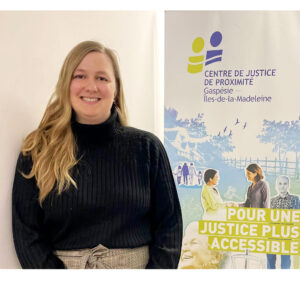 How does alimony work? What do you need to know when you’re the liquidator of an estate? What recourse do we have when our luggage goes missing after a flight? We all have questions at one time or another about our legal rights and duties. And it’s not always easy to make sense of it all. Fortunately, the Gaspé Peninsula – Magdalen Islands Community Justice Center (GPMICJC) is there to help us make sense of it all. How? We met its General Manager, Maude Lapointe, to find out.
How does alimony work? What do you need to know when you’re the liquidator of an estate? What recourse do we have when our luggage goes missing after a flight? We all have questions at one time or another about our legal rights and duties. And it’s not always easy to make sense of it all. Fortunately, the Gaspé Peninsula – Magdalen Islands Community Justice Center (GPMICJC) is there to help us make sense of it all. How? We met its General Manager, Maude Lapointe, to find out.
What is a Community Justice Centre?
“Where can you get free access to a lawyer these days?” Me Lapointe replied: “At the local legal centre, we’re a non-profit organization. Our primary mission is to promote access to legal services and the participation of individuals in their legal affairs. We encourage this participation through our legal information services and information sessions, and we also support and direct people to the right resources and tools,” she added.
In what circumstances can services be accessed?
The GPMICJC offers information free of charge to residents of the Gaspé Peninsula – Magdalen Islands region, regardless of their income. Living in the region is the only criterion for access, as Me Lapointe mentioned. She also indicated that almost every region of Quebec has its own Community Justice Centre. People of legal age, minors, and even interveners can access the confidential services offered by the organization. But what exactly are these services?
Information, support, and guidance
“We offer legal information tailored to the individual’s situation. Be careful: it’s not legal advice, it’s not the same thing. We provide information relevant to the individual, but we can’t tell them, for example, that they have a good chance of winning their case or draw up documents for them.” The General Manager added, “we stay within the realm of information, of presenting all possible options, but we don’t go into the realm of advice or representation.”
At the GPMICJC, all legal issues can be discussed. But in which areas do men ask the most questions? Me Lapointe continued, “We get a lot of questions about housing law, but also about family law: everything to do with separation, child custody, and alimony. We also have inheritance law. These are the main areas, but they’re not the only ones.”
Information sessions
The GPMICJC also offers another type of service. Me Lapointe explained: “We offer information sessions to organizations that request them. We travel all over the Gaspé Peninsula – Magdalen Islands to offer these information sessions, and there are no associated costs for the organizations. Many topics are covered. To give just a few examples, there are protection mandates, wills, housing law and de facto spouses,” You may have already noticed the mention of these information sessions on the GPMICJC Facebook and Instagram pages. In many cases, you can register for these sessions by contacting the partner organizations.
How does it work?
How do I access the services of the Gaspé Peninsula – Magdalen Islands Community Justice Center? It’s very simple. Just call (418 689-1505 or 1 844 689-1505) to be added to the call return list. You can also make an appointment to meet at the Community Justice Centre offices in Chandler or the Magdalen Islands.
Respect, empathy, open-mindedness and impartiality are among the values of the Community Justice Centre. “It’s a very human right when you work in the community,” stated Me Lapointe. She added: “the team always takes the time to listen to people. And there’s no limit to the number of calls per person per year. As long as the individual has relevant questions and is making progress, we’ll continue to respond and then provide the information.”
Knowing our rights: to promote our well-being
Why is GPMICJC ‘s work so useful? It’s there to help us better understand our rights and responsibilities. You could even say that this organization, Table de concertation sur les réalités masculines de la Gaspésie-Îles-de-la-Madeleine member, in a way promotes our well-being.
Me Lapointe stressed: “It’s really important to know your rights so you can make informed decisions when faced with a choice. In fact, it gives us the right tools, the autonomy, the ability to think about what’s the best option for us, but also to know our responsibilities. It also enables us to know how to behave in everyday life, or to know the impact of the decisions we make. I’d say it helps us live together better.”
Some advice to consider
Finally, we asked Me Lapointe if she had any advice on what to do when faced with a rights-related situation, such as a conflict with a neighbor. She advised: “When you’re going through a conflict or a situation and you’re not sure what decision you should make, it’s important to take a step back and then call us. It’s best not to make a decision on the spot, but always to say: I’m going to check. What are my rights? What are my obligations? Then take that step back before making a decision that could have an impact. That’s what we often say to people who come to us for information. Before you go knocking on your neighbor’s door for shovelling snow, take a step back, check your rights and obligations, and then act calmly.”
A positive impact for everyone
What’s the bottom line? That when you have legal questions, it’s a good idea to turn to the GPMICJC. It can be a real asset in helping you make better decisions, and in guiding you through situations that leave you with a lot of questions. Why not take advantage of it?
To find out more about the Gaspé Peninsula – Magdalen Islands Community Justice Center, visit its website.








